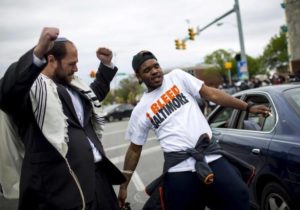Jews and blacks are as disparate as two groups can get in America. They have minimal daily interaction. They live in different places and work in different fields. Yet a small number of elites among both groups have occasionally found common cause, but this coalition is weak.
If a Jew is a normal orthodox Jew, he puts Jewish interests first. If a black is a normal black, he puts black interests first. These interests at times coincide but they frequently diverge.
Jews and almost all groups, including Muslims, have common interests at certain times and places, and at other times and places, their interests diverge.
Ellen Wexler writes: In its new platform, the Movement for Black Lives—a coalition of more than 50 social-justice groups of which the Black Lives Matter Network is a member—called for action on dozens of policy issues, including ending U.S. aid to Israel.
“We want investments in Black communities, determined by Black communities and divestment from exploitative forces,” the platform reads.
Since it went live on Aug. 1, the platform has left some American Jewish groups trying to balance their obligation to the racial justice movement with their dedication to Israel. They wonder: Do the two beliefs oppose each other? What role can left-leaning Jews play in Black Lives Matter?
The platform represents the most comprehensive plan yet to emerge from the Black Lives Matter movement. In its section on investment and divestment, it argues that the United States should redirect aid to Israel to domestic issues such as education, health care and housing. It also calls Israel an “apartheid state” and argues that the U.S. “is complicit in the genocide taking place against the Palestinian people.”
Many American Jewish groups, drawing on a tradition of Jewish involvement in the American civil rights movement, have supported Black Lives Matter. But now, some of those groups are having trouble reconciling their support with the movement’s stance on Israel. In the days following the platform’s publication, a number of establishment Jewish groups have spoken out against it, condemning the coalition’s support of the Boycott, Divestment and Sanctions movement.
But even among the smaller, more liberal organizations, many were angered by the platform’s language—specifically, the decision to label Israel’s actions a “genocide.”
One of those groups is T’ruah, a Jewish activist organization that also advocates for the rights of Palestinians. But the group argued that Israel’s actions cannot be compared to genocides like the Holocaust—or to other 20th-century genocides, such as those in Rwanda and Armenia.
“While we agree that the occupation violates the human rights of Palestinians, and has caused too many deaths,” the group wrote in a statement, “the Israeli government is not carrying out a plan intended to wipe out the Palestinians.”
The Union for Reform Judaism also denounced the Movement for Black Lives’ stance, arguing that supporting Israel and fighting systemic racism should not be mutually exclusive. American Jews should not have to choose between the two movements, Rabbi Jonah Dov Pesner wrote on behalf of the group, calling the platform’s language “offensive and odious.” “It’s never helpful, never helpful to use phrases like ‘complicit in genocide,’ which is patently false, or to make unfair analogies to apartheid,” Pesner told The Washington Post.
Yet since at least 2014—when Michael Brown was killed in Ferguson, Mo.—the Black Lives Matter movement and the Palestinian human rights movement have been, in some ways, inextricably linked. While the movements had never forged an official affiliation, activists from both began to draw parallels and express solidarity, as Moment’s cover story explored earlier this year. By 2015, over 1,000 activists had signed a Black Solidarity Statement with Palestine.
The new platform marks the first time such a prominent faction of the Black Lives Matter movement has codified its stance on Israel and Palestinian solidarity. And now, some Jewish groups say that the platform precludes their support entirely.
On Wednesday, Boston’s Jewish Community Relations Council announced that it would dissociate itself from the Black Lives Matter platform altogether. “To conflate the experiences of African-Americans and Palestinians,” the group writes, “oversimplifies complex matters and advances false equivalencies that diminish the unique nature of each.”
But why, others argue, should Jewish groups—even those who disagree with the platform’s position on Israel—denounce the movement in its entirety?
“We are appalled at the actions of the white U.S. institutional Jewish community in detracting and distracting from such a vital platform at a time when Black lives are on the line, simply because the organizers chose to align their struggle with the plight of Palestinians,” the Jews of Color Caucus said in a statement.
And when Jewish groups denounce the Movement for Black Lives’ new platform, what does that mean for black Jews?
Those critiques, the group writes, send a message: “that the lives of Black Jews (along with Black gentiles) directly affected by US police brutality are less important than protecting Israel from scrutiny.”
Jewish Voice for Peace, an activist group that supports the BDS movement, also expressed disappointment with the responses from critical Jewish groups. In a statement, the group wrote that it “endorses the Movement for Black Lives platform in its entirety, without reservation.”

